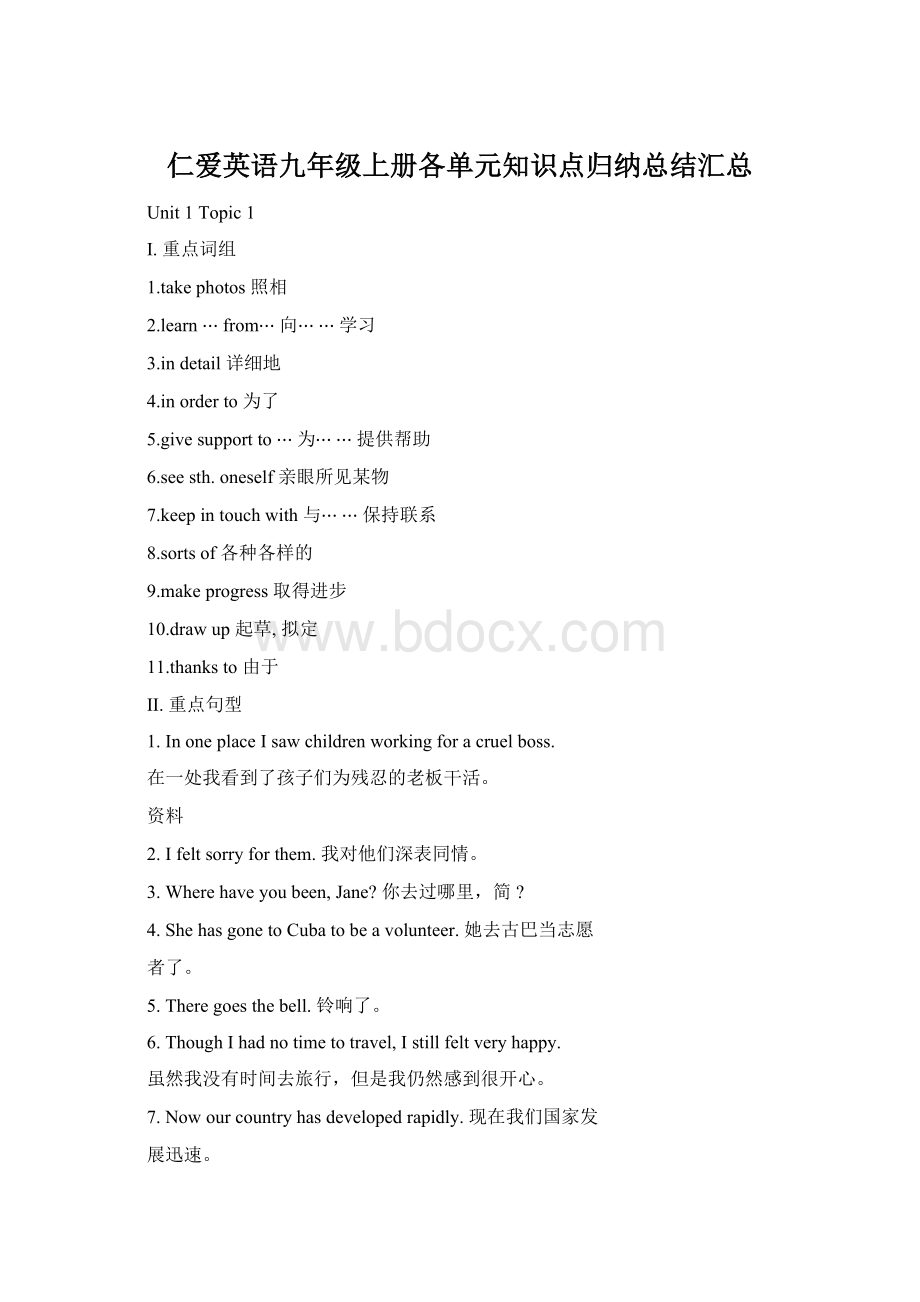仁爱英语九年级上册各单元知识点归纳总结汇总.docx
《仁爱英语九年级上册各单元知识点归纳总结汇总.docx》由会员分享,可在线阅读,更多相关《仁爱英语九年级上册各单元知识点归纳总结汇总.docx(27页珍藏版)》请在冰豆网上搜索。

仁爱英语九年级上册各单元知识点归纳总结汇总
Unit1Topic1
I.重点词组
1.takephotos照相
2.learn⋯from⋯向⋯⋯学习
3.indetail详细地
4.inorderto为了
5.givesupportto⋯为⋯⋯提供帮助
6.seesth.oneself亲眼所见某物
7.keepintouchwith与⋯⋯保持联系
8.sortsof各种各样的
9.makeprogress取得进步
10.drawup起草,拟定
11.thanksto由于
II.重点句型
1.InoneplaceIsawchildrenworkingforacruelboss.
在一处我看到了孩子们为残忍的老板干活。
资料
2.Ifeltsorryforthem.我对他们深表同情。
3.Wherehaveyoubeen,Jane?
你去过哪里,简?
4.ShehasgonetoCubatobeavolunteer.她去古巴当志愿
者了。
5.Theregoesthebell.铃响了。
6.ThoughIhadnotimetotravel,Istillfeltveryhappy.
虽然我没有时间去旅行,但是我仍然感到很开心。
7.Nowourcountryhasdevelopedrapidly.现在我们国家发
展迅速。
III.语法
1.现在完成时态的构成:
助动词have/has+动词的过去分词
e.g.Youhavejustcomebackfromyourhometown.
2.现在完成时态的句式:
e.g.
(1)IhavebeentoMountHuangwithmyparents.
(2)Ihaven’tseenhimforalongtime.
(3)Wherehaveyoubeen?
资料
(4)——Haveyouevercleanedaroom?
——Yes,Ihave./
No,Ihaven’t.
3.have/hasbeen与have/hasgone的区别
have/hasbeentosp.表示曾经到过某地——have/hasgoneto
sp.表示已经去了某地
e.g.
(1)IhavebeentoMountHuangwithmyparents.
(2)
ShehasgonetoCubatobeavolunteer.
Unit1Topic2
I.重点词组
1.getlost迷路
2.eachother彼此
3.atleast至少
4takeplace发生
5becauseof因为
6.bestrictwithsb.对某人严格要求
资料
7.carryout实行
8.beshortof缺乏
9.takemeasurestodosth.采取措施做某事
10.beknownas⋯作为⋯⋯而著名
11.workwellindoing⋯在⋯⋯方面起作用
12.acoupleof一些
13keepupwith赶上,跟上
II.重点句型
1.Haveyoufoundhimyet?
你已经找到他了吗?
2.——Ireallyhatetogoshopping.我的确讨厌购物。
—
—SodoI.我也如此。
3.Butitseemsthattheirlivingconditionswerenotvery
good.但是似乎他们的生活条件不太好。
4.ButgreatchangeshavealreadytakenplaceinChina
recently.但是近来中国已发生了巨大的变化。
5.Becauseoftheone-childpolicy,nowmostfamilieshave
onlyonechild.
资料
由于我国独生子女政策的实行,现在大部分家庭只有一个孩子。
6.What’sthepopulationoftheU.S.A.?
美国的人口是多少?
7.——What’smore,thepopulationindevelopingcountries
isgrowingfaster.——Soitis.
而且,发展中国家的人口在更快地发展。
的确如此。
8.Ourgovernmenthastakenmanymeasurestocontrolthe
population.
我们的政府已采取了许多控制人口的措施。
III.语法:
常用于现在完成时的时间状语:
already,just,yet,ever,
never,recently.
e.g.1.Ihavejustcalledyou.
2.——HaveyoueverbeentoFrance?
——No,I’venever
beentoanyEuropeancountries.
3.——Haveyouseenhimyet?
——Yes,Ihaveseenhim
already.
Unit1Topic3
资料
I.重点词组
1.getusedtosth./doingsth.习惯于⋯⋯
2.asamatteroffact事实上
3.breakout爆发
4.liveahardlife过着艰难的生活
5.inneedof需要
6.providesb.withsth.=providesth.forsb.提供某物给
某人
7.one’ssuccessindoingsth.成功完成某事
8.obeystrictrules遵守严格的规则
9.takedrugs吸毒
10.aimtodosth.目的是
11.inthepastsixteenyears在过去的十六年里
12.athomeandabroad在国内外
13.payfor付款
14.thousandsof成千上万的
资料
II.重点句型
1Youmustcomeforavisit.请你一定来参观。
2Well,oncetheyfindpeopleindeed,theydecideon
suitablewaystohelpthem.
他们一旦发现有人需要帮助,就选定适当的方式来帮助他们。
3Ithinkitisimportantforthesepeopletofeelgoodabout
themselves.
我认为对于这些人来说,自我感觉良好是重要的。
4Theworldhaschangedforthebetter.世界变得更加美好。
5Withthemoney,ithasbuiltthousandsofschoolsand
trained2,300teachers.
它用这钱修建了数千所学校和图书馆并且培训了2300名教师。
III.语法
1.现在完成时:
常与for或since引导的时间状语连用,表示从
过去某一时刻延续到现在。
e.g.YouhavebeeninNewYorkforalongtime.
资料
ThecityhasimprovedalotsinceIcamehereafewyears
ago.
2.构词法:
合成词:
home+work=homework
派生词:
use——useful,happy——unhappy
仁爱英语九年级Unit2语言点归纳
Unit2Topic1
I.重点词组
1.chemicalfactory化工厂
2.pour⋯into⋯把⋯⋯排放到⋯⋯
3.inabadmood处在不好的情绪中
4.managetodosth.设法去做某事
5.doharmto⋯/beharmfulto⋯对⋯⋯有害
6.quiteafew相当多
资料
7.nobetterthan同⋯⋯.一样差
8.inpubic公开地
9.allsortsof各种各样的
10.inmanyways在许多方面
II.重点句型
1.Look,thereareseveralchemicalfactoriespouringwaste
waterintothestreams.
看,有几家化工厂正往河里排放废水.
2.Everythinghaschanged.一切已发生了变化.
3.Howlonghaveyoubeenlikethis?
你像这样多长时间了?
4.I’malwaysinabadmoodbecauseIcan’tstandthe
environmenthere.
我的情绪总是很差因为我受不了这里的环境.
5.However,notallpeopleknowthatnoiseisalsoakind
ofpollutionandisharmfultohumans’health.
然而,并非所有的人都知道噪音也是一种污染,而且有害于人类
健康.
资料
III.语法
直接引语和间接引语
1.Grannysaid,“I’mfeelingevenworse.”
Grannysaidthatshewasfeelingevenworse.
2.“Doyoustillwanttolivehere,Granny?
”the
journalistasked.
ThejournalistaskedGrannyifshestillwantedtolive
there.
3.“Howistheenvironmentaroundthisplace?
”the
journalistasked.
Thejournalistaskedhowtheenvironmentaroundthatplace
was.
Topic2
I.重点词组
1.asaresult结果
2.hereandthere到处
3.inthebeginning一开始
资料
4.indanger处于危险中
5.cutdown砍倒
6.changesth.intosth.把⋯⋯变成⋯⋯
7.preventfrom防止
8.greenhouseeffect温室效应
9.referto提到
10.dealwith处理
11.takeup占据
12.cutoff中断
II.重点句型
1.Asweknow,noneofuslikespollution.众所周知,没有
人喜欢污染。
2.Humanshavecometorealizetheimportantofprotecting
animals.人类逐渐意识到保护动物的重要性。
3.Treescanalsostopthewindblowingtheearthaway.
树木也能防风固土。
资料
4.Cuttingdowntreesisharmfultohumanbeings,animals
andplants.砍伐树木对人类、动植物都有害。
5.Somethingswe’vedoneareverygoodforearthwhile
somearenotgood.
我们所做的,有些对地球很好,而有些不利。
6.Theycanalsopreventthewaterfromwashingtheearth
away.它们也能阻止水土流失。
7.Whenitrainsorwhenthewindblows,theearthistaken
away.天一下雨或刮风,土就会被冲走或刮走。
III.语法
不定代词:
1.定义:
指的是那些不指明代替任何特定名词或形容词的代词。
2.用法:
在句中可作主语、宾语、表语、定语等。
something,
somebody,anything,anybody等作主语时,通常视为单数。
当形容
词修饰它们时,要放在其后。
e.g.Butthegovernmenthasdonesomethingusefulto
protecttheenvironment.
Topic3
资料
I.重点词组
1.notonly⋯butalso⋯不仅⋯⋯而且⋯⋯
2.besupposedto应该
3.oughtto应该
4.turnoff关掉
5.insteadof代替
6.ontime准时
7.makesure确保
8.pushforward向前推
9.pushdown向下
10.pullup向上拉
II.重点句型
1.Forexample,weshouldusebothsidesofpaperandreuse
plasticbags.
例如,我们应该用纸的两面,并且重新使用塑料袋。
2.Everyoneissupposedtodothat.每个人都有义务那样做.
资料
3.First,yououghttoturnoffthelightswhenyouleave
aroom.首先,你离开房间时应该随手关灯。
4.Easiersaidthandone.说起来容易做起来难。
5.Well,actionsspeaklouderthanwords.嗯,百说不如一
做。
6.Therewillbealotofhardworktodotomorrow,somake
sureyougotobedearlytonight.
明天有许多繁重的活要干,今晚一定要早睡。
III.语法
并列句:
由两个或两个以上并列而又相互独立的简单句构成。
结构为:
简单句+并列连词+简单句
常用的并列连词有:
and,or,but,while,notonly⋯butalso
e.g.1.Theriverisdirtyandthetemperatureoftheearth
isrising.
2.Theyworkwell,buttheyareslowandcan’trunforlong.
资料
Unit3Topic1
一.重点词语
1.beableto=can能够,会
2.can’twaittodosth.迫不急待地做某事
3.havea(good)chancetodosth.有(好)机会做某事
4.practicedoingsth.练习做某事
5.bemadeby⋯被⋯⋯制做;bemadeof/from⋯由⋯⋯制成;be
madein⋯在某地制造
6.onbusiness出差
7.besimilarto⋯和⋯⋯相似
8.translate⋯into⋯把⋯⋯翻译成⋯⋯
9.haveno/sometrouble(in)doingsth.做某事没有/有些困
难
10.onceinawhile=sometimes/attimes偶尔,间或
11.whenever=nomatterwhen无论何时
资料
12.aswellas以及
13.mothertongue母语
14.taketheleadingposition处于领先地位
15.encouragesb.todosth.鼓励某人做某事
16.callfor号召
二.重点句型
1.Disneylandisenjoyedbymillionsofpeoplefromallover
theworld.世界上数以百万的人们都喜欢迪斯尼乐园。
2.IhopeIcangothereoneday.希望有一天我能去那儿。
3.Englishiswidelyspokenaroundtheworld.英语在世界上
被广泛使用。
4.Itisalsospokenasasecondlanguageinmanycountries.
在许多国家它也被用作第二语言。
5.Itispossiblethatyouwillhavesometrouble.你可能
会遇到一些麻烦。
6.It’susedasthefirstlanguagebymostpeoplein
America,Canada,Australia,GreatBritainandNewZealand.
资料
它被美国、加拿大、澳大利亚、英国和新西兰的大多数人用作第
一语言。
7.Andtwothirdsoftheworld’sscientistsreadEnglish.
并且世界上三分之二的科学家用英语阅读。
三.语法学习
一般现在时的被动语态
英语语态有主动语态和被动语态两种。
主语是动作的执行者,叫
主动语态。
如:
Wecleantheclassroom.我们打扫教室。
主语是动作的承
受者,叫被动语态。
如:
Theclassroomiscleaned(byus).教室被(我们)打扫。
1.被动语态的构成:
助动词be+及物动词的过去分词+(by+宾语)
其中by意为“被⋯⋯;由⋯⋯”,表动作的执行者。
如:
Theglassisbrokenbythatboy.玻璃杯是那个男孩打破
的。
be有人称、数和时态的变化,其肯定式、否定式、疑问式的变
化规则与be作为连系动词时完全一样。
资料
如:
Englishiswidelyspokenaroundtheworld.(肯定式)
Englishisnotwidelyspokenaroundtheworld.(否定式)
IsEnglishwidelyspokenaroundtheworld?
(疑问式)
Yes,itis./No,itisn’t.
2.被动语态的用法:
(1)在没有指明动作的执行者或者不知道动
作执行者的情况下可用被动语态。
如:
Thiscoatismadeofcotton.
这件大衣是棉制的。
(2)要强调动作的承受者而不是执行者时,用被
动语态。
如:
Herbikeisstolen.她的自行车被偷了。
3.主、被动语态的转换:
主动语态:
主语+及物动词谓语动词+宾语(+其它)
被动语态:
主语+be+及物动词的过去分词+by+宾语(+其它)
注意:
(1)主动、被动互转时,时态不变。
(2)主动句的主语是代
词的主格形式,变成被动态by的宾语时,要用宾格形式。
如:
(1)Peoplegrowriceinthesouth.Riceisgrown(bypeople)
inthesouth.
资料
(2)Shetakescareofthebaby.Thebabyistakencareof
(byher).
四.交际用语:
谈论英语的广泛使用
1.---You’llhaveagoodchancetopracticespeakingEnglish
there.
---You’reright.
2.---ButI’mnotgoodatEnglish.I’malittleafraid.
---Don’tworry.
3.---IsSpanishsimilartoEnglish?
---Notreally.
Topic2
一.重点词语
1.bytheway顺便说一下
2.dependon取决于⋯⋯;依靠⋯⋯
3.bedifferentfrom与⋯⋯不同4.succeedin成功,达成
5.makeyourselfunderstood表达你自己的意思
6.onone’swayto在某人去⋯⋯的路上
资料
7.seesb.Off给⋯⋯送行
8.leavefor⋯前往某地/leave⋯for⋯离开⋯去⋯
9.intwentyminutes二十分钟之后
10.writtenEnglish笔头英语/oralEnglish英语口语
11.generallyspeaking一般说来,大致上说
12.asforsb./sth.至于某人/某物
13.becloseto⋯靠近⋯⋯
14.inperson身体上,外貌上;亲自
15.befoundof⋯爱好⋯⋯
16.beforcedtodosth.被迫做⋯⋯/forcesb.todo强迫某
人做某事
17.evenworse更糟的是
二.重点句型
IsAustraliaEnglishthesameasBritishEnglish?
澳式英
语和英式英语一样吗?
资料
2.Englishisspokendifferentlyindifferent
English-speakingcountries.
不同的国家使用不同的英语。
3.Forexample,therearedifferencesbetweenBritish
EnglishandAmericanEnglish.例如,在英式英语和美式英语之间
有些不同点。
4Ican’tbelievethatI’mflyingtoDisneyland.我简直
不敢相信我就要飞往迪斯尼乐园了。
5.IhopeIw